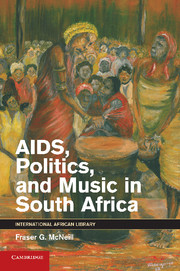Book contents
- Frontmatter
- Contents
- Maps
- Preface
- Acknowledgements
- Abbreviations
- Select Glossary of Tshivenda Terms in the Text
- Maps
- 1 Introduction
- 2 The Battle for Venda Kingship
- 3 A Rite to AIDS Education? Venda Girls’ Initiation, HIV Prevention, and the Politics of Knowledge
- 4 ‘We Want a Job in the Government’
- 5 ‘We Sing about What We Cannot Talk About’
- 6 Guitar Songs and Sexy Women
- 7 ‘Condoms Cause AIDS’
- 8 Conclusion
- Appendix A: Songs on Accompanying Web Site
- Appendix B: ‘Zwidzumbe’ (Secrets)
- Appendix C: AIDS, AIDS, AIDS
- References
- Index
3 - A Rite to AIDS Education? Venda Girls’ Initiation, HIV Prevention, and the Politics of Knowledge
Published online by Cambridge University Press: 05 November 2011
- Frontmatter
- Contents
- Maps
- Preface
- Acknowledgements
- Abbreviations
- Select Glossary of Tshivenda Terms in the Text
- Maps
- 1 Introduction
- 2 The Battle for Venda Kingship
- 3 A Rite to AIDS Education? Venda Girls’ Initiation, HIV Prevention, and the Politics of Knowledge
- 4 ‘We Want a Job in the Government’
- 5 ‘We Sing about What We Cannot Talk About’
- 6 Guitar Songs and Sexy Women
- 7 ‘Condoms Cause AIDS’
- 8 Conclusion
- Appendix A: Songs on Accompanying Web Site
- Appendix B: ‘Zwidzumbe’ (Secrets)
- Appendix C: AIDS, AIDS, AIDS
- References
- Index
Summary
Ritual knowledge, unlike science, is antithetical to change. It is conceived of as the property of the ancestors, the founders of all social life. It must be handed on, not tested, altered, improved or even discarded. Since it supports experience and validates the seniority of elders, it is not surprising if they throw the weight of their secular powers behind it. (La Fontaine 1985: 189)
In this chapter I develop the argument that state interference in the political economy of kingship has been integral to the promotion of ‘tradition’ in post-apartheid Venda. I address the ways in which this is connected to a recent increase in the frequency of female initiation, and analyse the dynamics of King Tshivhase's assertion that ritual elders, in his region, have incorporated HIV/AIDS education into the ritual process.
At the initiations I attended in the village of Dopeni (see Map 4), I expected to find ritual experts following Tshivhase's instruction to include HIV/AIDS education in the curriculum. On the contrary, however, there was a violent reaction against its inclusion in the ceremony, which ended with ritual experts punishing the initiates (vhatei) for singing about condoms and antiretroviral (ARV) medication. Through the expulsion of AIDS knowledge, biomedical AIDS knowledge, the elders were acting to entrench positions of privilege in a ritual hierarchy by protecting a monopoly on ancestral knowledge. Biomedical explanations of the epidemic, introduced to the ritual by the initiates, were interpreted as a threat to the established order in which the authority of ancestral knowledge is absolute. This reveals that although structures of chiefly power have recently been bolstered by national government, they remain relatively powerless to penetrate and influence the hierarchical structures upon which female initiation depends for its performance and regulation. Moreover, the evidence presented in this chapter demonstrates that if biomedical AIDS education is to be incorporated into female initiation ceremonies, then elderly women (as ritual elders) must either be as fluent in the nuances of scientific explanation as are their younger counterparts, or at least be accepting of this source of knowledge.
- Type
- Chapter
- Information
- AIDS, Politics, and Music in South Africa , pp. 74 - 113Publisher: Cambridge University PressPrint publication year: 2011



